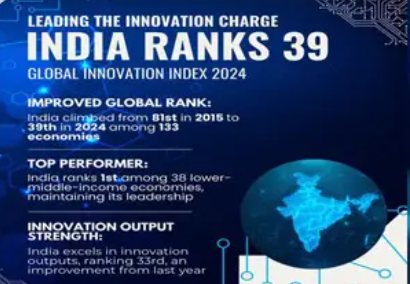
Context
India has elevated to 39th place among 133 international economies within the Global Innovation Index 2024.
About
- The Global Innovation Index (GII) is posted by the World Intellectual Property Organization (WIPO), a specialized company of the United Nations.
- It measures innovation based on criteria that include institutions, human capital and research, infrastructure, credit score, investment, linkages; the advent, absorption and diffusion of information; and creative outputs.
Global Innovation Index 2024
- Top performer: Switzerland, Sweden, United States, Singapore and the UK
- Fastest 10-year climbers: China, Turkiye, India, Viet Nam and the Philippines.
India’s Performance
- India has been on a rising trajectory, over the past several years within the Global Innovation Index (GII), from a rank of 81 in 2015 to 40 in 2023.
- India’s strengths lie in key indicators such as Information and Communications Technology (ICT) services exports (at 1st place, globally), mission capital received and intangible asset intensity.
- India’s unicorn groups also secure the country the 8th rank globally.
Initiatives taken by India
- The Atal Innovation Mission has played a chief role in increasing the Innovation atmosphere.
- The Anusandhan National Research Foundation (ANRF) was established to foster a lifestyle of research and innovation for the duration of India’s universities, research institutions, and R&D laboratories.
- Biotechnology Industry Research Assistance Council (BIRAC) established by the Department of Biotechnology (DBT) is geared toward strengthening and empowering emerging biotechnology companies to adopt strategic studies and innovation.
- National Research Foundation (NRF): Announced as a part of the National Education Policy 2020, NRF aims to promote a way of life of studies and innovation in universities and better education institutions via investment in interdisciplinary research.
Challenges
- Fragmented Innovation Ecosystem: India’s innovation ecosystem lacks integration among academia, industry, and government. Collaboration across these sectors is weak, leading to poor commercialization of studies outputs
- Skill Mismatch and Brain Drain: Despite a huge pool of STEM graduates, many lack the skills required for modern innovation.
- Additionally, many professional experts seek higher opportunities overseas, contributing to brain drain.
- Infrastructural Bottlenecks: Insufficient infrastructure, specifically in rural and semi-city areas, hinders the growth of revolutionary organisations.
- Private sector participation in R&D remains restrained in India. However in leading progressive economies where personal organizations play a great role in R&D.
Way Ahead
- The regular development in the GII ranking is attributable to the knowledge capital and vibrant start-up environment.
- However there is a need to encourage more private zone involvement in R&D and innovation in rising fields consisting of Artificial Intelligence (AI), Internet of Things (IoT), Blockchain, Quantum Computing etc.
Source: PIB
Post Views: 680
